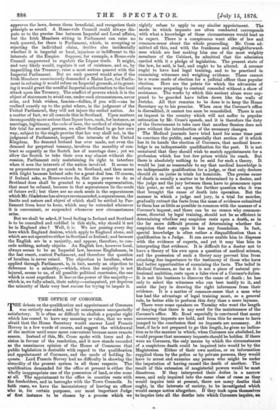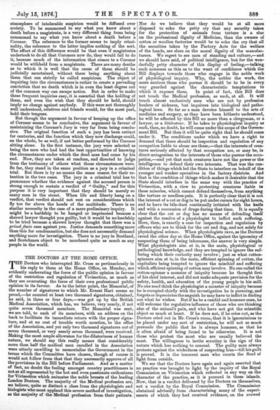THE OFFICE OF CORONER. T HE debate on the qualification and
appointment of Coroners was entirely one-sided, and by consequence unexpectedly satisfactory. It is often so difficult to abolish a popular right which has ceased to have any meaning or value, that we were afraid that the Home Secretary would answer Lord Francis Hervey in a few words of course, and suggest the withdrawal of the motion until some more convenient because more remote season. Instead of this, Mr. Cross spoke with force and de- cision in favour of the resolution, and it now stands recorded as the unanimous opinion of the House of Commons that public legislation is desirable with regard to the qualification and appointment of Coroners, and the mode of holding In- quests. Lord Francis Hervey had no difficulty in showing the absurdity of the present system in all these respects. The qualification demanded for the office at present is either the wholly inappropriate one of the possession of land, or else none at all. The appointment to the office in counties rests with the freeholders, and in boroughs with the Town Councils. In both oases, we have the inconsistency of leaving an officer who is, for certain purposes, our most important Judge of first instance to be chosen by a process which we rightly refuse to apply to any similar appointment. The mode in which inquests are often conducted corresponds with what a knowledge of these circumstances would lead us to expect. There is a conspicuous want alike of law and common-sense about the whole proceeding. Mr. Cross ad- mitted all this, and with the frankness and straightforward- ness which are fast making him one of the most weighty members of the Cabinet, he admitted that the admission carried with it a pledge of legislation. The present state of the law, he said, is bad, and ought to be altered. A coroner ought to have had legal training, and to be practised in examining witnesses and weighing evidence. There cannot be a worse mode of election for a judicial officer than popular election. Here are the points for which the advocates of reform were preparing to contend conceded without a show of resistance. The works by which this ancient abuse were sup- posed to be guarded have fallen down like the walls of Jericho. All that remains to be done is to keep the Home Secretary up to his promise. When once the Coroner's office is discredited, it cannot too soon be remodelled. There is not an inquest in the country which will not suffer in popular estimation by Mr. Cross's speech, and it is therefore the duty of the Government to take care that another Session does not pass without the introduction of the necessary changes. The Medical journals have tried hard for some time past to convince the public, and especially that section of it which has in its hands the election of Coroners, that medical know- ledge is an indispensable qualification for the post. It is not unnatural that they should wish to snatch appointments for a profession which has bat -few prizes within its reach. But there is absolutely nothing to be said for such a theory. It would be just as reasonable to say that medical knowledge is an indispensable qualification for a judge, or that only doctors should sit on juries in trials for homicide. The precise cause of death is usually a matter to be determined by a doctor, and the judge and the jury between them have to pronounce upon this point, as well as upon the further question who it was that brought the cause of death into operation. But the manner in which a judge and jury, in a trial for murder, gradually extract the facts from the mass of evidence submitted to them has as little as possible in common with the manner of a Coroner's inquest, and there can be no reason why common- sense, directed by legal training, should not be as efficient in determining whether any suspicion rests upon a death, as in the far more difficult process of determining whether the suspicion that rests upon it has any foundation. In fact, special knowledge is often rather a disqualification than a qualification in a Judge. It can never enable him to dispense with the evidence of experts, and yet it may bias him in interpreting that evidence. It is difficult for a doctor not to have a theory of his own upon a question of medical science, and the possession of such a theory may prevent him from attaching due importance to the testimony of those who have had better opportunities of examining the facts. The belief in Medical Coroners, so far as it is not a piece of natural pro- fessional ambition, rests upon a false view of a Coroner's duties. It is not his business to discover the cause of death ; he has only to select the witnesses who can best testify to it, and assist the jury in drawing the right inferences from their evidence. It is a matter of common-sense that a man who has had the advantage of legal training must, as a general rule, be better able to perform this duty than a mere layman.
There were some speakers on Tuesday who went the length of denying that there is any need for the maintenance of the Coroner's office. Mr. Read especially is convinced that many unnecessary inquests are held, and from this he seems to have jumped to the conclusion that no inquests are necessary. At least, if he is not prepared to go this length, he gives no indica- tion as to the manner in which, when Coroners are abolished, he would propose that necessary inquests should be holden. If there were no Coroners, the only means by which the circumstances of a suspicious death could be inquired into would be by the Magistrates. Either of their own motion, or on information supplied them by the police or by private persons, they would have to arrest and examine any person who might be under the imputation of having caused the death of another. The result of this extension of magisterial powers would be most disastrous. If they interpreted their duties in a narrow sense, and only inquired into the same class of cases as they would inquire into at present, there are many deaths that ought, in the interests of society, to be investigated which would escape notice altogether. If they took upon themselves to inquire into all the deaths into which Coroners inquire, an atmosphere of intolerable suspicion would be diffused over society. To be summoned to say what you know about a death before a magistrate, is a very different thing from being summoned to say what you know about a death before a Coroner. The reference to the former seems to imply crimi- nality, the reference to the latter implies nothing of the sort. The effect of this difference would be that even if magistrates undertook to do all that Coroners now do, they would fail to do it, because much of the information that comes to a Coroner would be withheld from a magistrate. There are many deaths as to which it is well that the cause of them should be judicially ascertained, without there being anything about them that can strictly be called suspicious. The object of inquiring into the circumstances is rather to create a pervading conviction that no death which is in even the least degree out of the common way can escape notice. But in order to make these frequent inquiries easy, it is essential that the holding of them, and even the wish that they should be held, should imply no charge against anybody. If this were not thoroughly well understood, relatives and friends would, for the most part, hold their tongues.
But though the argument in favour of keeping up the office of Coroner seems to be conclusive, the argument in favour of maintaining the Coroner's Jury is very far from being conclu- sive. The original function of such a jury has been extinct for centuries, and the function which they now discharge could, on the whole, be as well, if not better performed by the Coroner sitting alone. In the first instance, the jury were selected as being the men who had had the best opportunities of knowing the circumstances under which the dead man had come by his end. Now, they are taken at random, and directed to judge from the testimony of others what those circumstances were. So far, they stand in the same position as a jury in a criminal trial. But there is by no means the same reason for their re- tention in the two cases. The jury in a criminal trial has to pronounce whether the evidence against the accused person is strong enough to sustain a verdict of " Guilty," and for this purpose it is very important that they should be merely so many men in the street. When life and liberty hang on a verdict, that verdict should not rest on considerations which fly too far above the heads of the multitude. There is no similar necessity in the case of a mere preliminary inquiry. It might be a hardship to be hanged or imprisoned because a shrewd lawyer thought you guilty, but it would be no hardship to be tried because a shrewd lawyer thought that there was a prima facie case against you. Justice demands something more than this for condemnation, but she does not necessarily demand anything more for investigation. There is no jury in Scotland, and Scotchmen object to be murdered quite as much as any people in the world.































 Previous page
Previous page